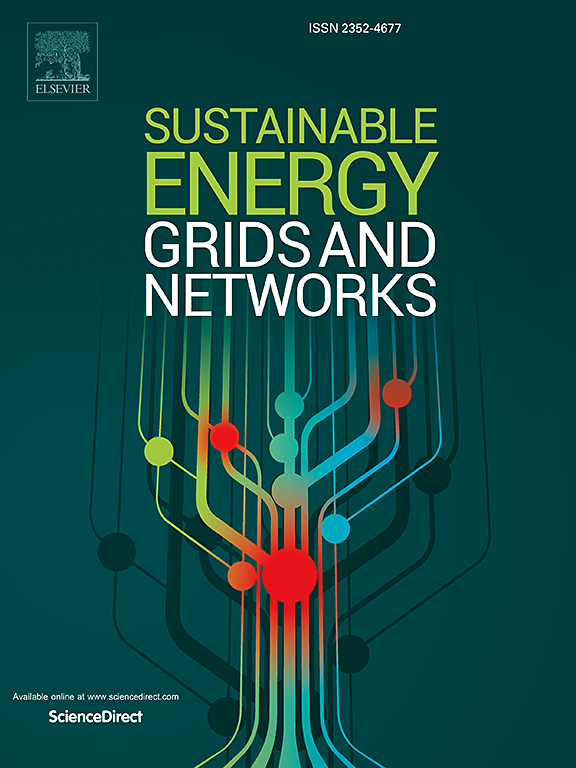Cluster partition-fuzzy broad learning-based fast detection and localization framework for false data injection attack in smart distribution networks
IF 4.8
2区 工程技术
Q2 ENERGY & FUELS
引用次数: 0
Abstract
The distributed renewable energy generations, as accessible and easily targets for attackers, introduce an extra false data injection attack (FDIA) threat in the smart distribution networks. Scattered attack points and complex attack features hinder the elimination of potential threats. In this context, an FDIA fast detection and pinpoint localization framework is proposed. This framework identifies abnormal signals and attacked nodes from the unique topology structure and status contiguity of smart distribution networks, namely, spatial-temporal correlations of power grids, by using a cluster partition-fuzzy broad learning system (CP-FBLS). Unlike most existing FDIA detection methods, which are dedicated to high accuracy but neglect the urgent need for rapid detection in smart distribution networks, the proposed CP-FBLS framework maintains the fast computational nature of a fuzzy broad learning system (FBLS), while avoiding the accuracy degradation caused by high-dimension of data in large-scale smart distribution networks. Moreover, the multi-layer structure of the proposed framework recognizes the location of FDIA, bridging the research gap of attack localization. To comprehensively evaluate the proposed strategy, datasets containing various FDIA types are constructed. Numerical simulations based on the above datasets in modified IEEE 34-bus and 123-bus distribution systems are implemented. The results of the case studies showed that the proposed method can achieve 98.43 % accuracy with 0.34 ms detection time, realizing rapid detection and localization of various FDIAs with satisfactory accuracy.
基于簇分区模糊广泛学习的智能配电网络虚假数据注入攻击快速检测和定位框架
分布式可再生能源发电是攻击者容易接近和攻击的目标,给智能配电网络带来了额外的虚假数据注入攻击(FDIA)威胁。分散的攻击点和复杂的攻击特征阻碍了潜在威胁的消除。在这种情况下,我们提出了一种 FDIA 快速检测和精确定位框架。该框架利用聚类分区-模糊广义学习系统(CP-FBLS),从智能配电网独特的拓扑结构和状态连续性(即电网的时空相关性)中识别异常信号和攻击节点。现有的 FDIA 检测方法大多致力于高精度检测,却忽视了智能配电网对快速检测的迫切需求,与之不同的是,本文提出的 CP-FBLS 框架既保持了模糊广义学习系统(FBLS)的快速计算特性,又避免了大规模智能配电网中高维数据带来的精度下降。此外,所提框架的多层结构可识别 FDIA 的位置,弥补了攻击定位的研究空白。为了全面评估所提出的策略,我们构建了包含各种 FDIA 类型的数据集。基于上述数据集,在修改后的 IEEE 34 总线和 123 总线配电系统中进行了数值模拟。案例研究结果表明,所提出的方法能以 0.34 毫秒的检测时间达到 98.43 % 的准确率,实现了对各种 FDIA 的快速检测和定位,准确率令人满意。
本文章由计算机程序翻译,如有差异,请以英文原文为准。
求助全文
约1分钟内获得全文
求助全文
来源期刊

Sustainable Energy Grids & Networks
Energy-Energy Engineering and Power Technology
CiteScore
7.90
自引率
13.00%
发文量
206
审稿时长
49 days
期刊介绍:
Sustainable Energy, Grids and Networks (SEGAN)is an international peer-reviewed publication for theoretical and applied research dealing with energy, information grids and power networks, including smart grids from super to micro grid scales. SEGAN welcomes papers describing fundamental advances in mathematical, statistical or computational methods with application to power and energy systems, as well as papers on applications, computation and modeling in the areas of electrical and energy systems with coupled information and communication technologies.
 求助内容:
求助内容: 应助结果提醒方式:
应助结果提醒方式:


